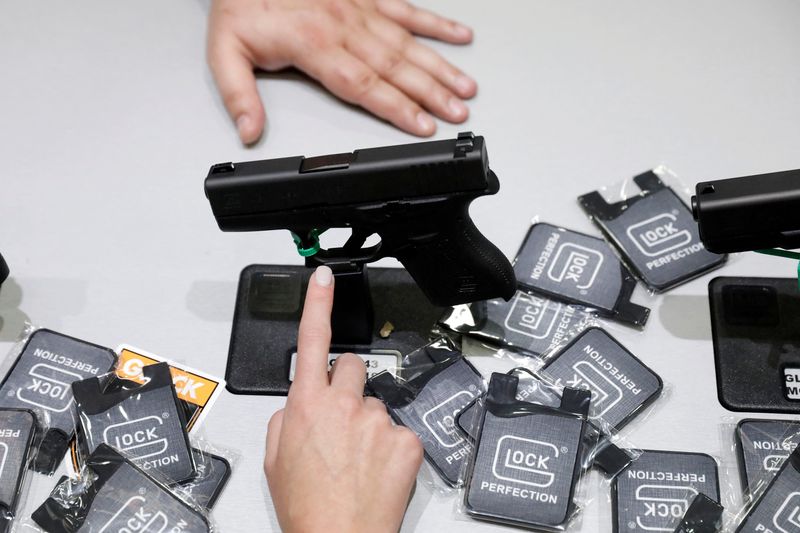By Kirsti Knolle
Gaston Glock, the reclusive engineer and tycoon who developed one of the world's best-selling handguns, died on Wednesday aged 94, Austrian news agency APA said.
The Austrian won loyal followings among police and military across the world with the weapons that bore his name. Forbes estimated his and his family's fortune at $1.1 billion in 2021.
His rise began in the 1980s when the Austrian military was looking for a new, innovative weapon.
Up until then, the Glock company had made military knives and consumer goods including curtain rods. But he assembled a team of firearms experts and came up with the Glock 17, a lightweight semi-automatic gun largely made of plastic.
The revolutionary design - with a frame made of a high-strength, nylon-based polymer and only the slide made of metal - beat several other companies' blueprints and secured his upstart outfit the contract.
Soon the easily assembled weapon became a global hit. "Get yourself a Glock and lose that nickel-plated sissy pistol," Tommy Lee Jones said in the 1998 movie "U.S. Marshals".
Many U.S. police officers used them and U.S. rappers worked them into their rhymes, among them Snoop Dogg's "Protocol" and Wu-Tang Clan's "Da Glock".
U.S. soldiers found toppled Iraqi President Saddam Hussein hiding with a Glock in a hole in the ground in 2003. They later presented that weapon to U.S. President George W. Bush, according to the New York Times.
Gun-control advocates criticised Glock for popularising powerful guns that they said were easy to conceal and could hold more ammunition than other guns.
A former U.S. Marine combat veteran armed with what police described as a .45 caliber Glock with a high-capacity magazine killed 12 people in a bar in Thousand Oaks, California, in November 2018.
White supremacist Dylann Roof used a Glock pistol to kill nine African-American people during a Bible study session at a church in Charleston, South Carolina, in June, 2015.
MALLET ATTACK
Glock himself rarely responded to criticism from activists, shunned public debate and, in 2000, refused to join other weapons manufacturers in signing a voluntary gun control deal with the U.S. government.
He made few comments of any kind to the press, but the public got glimpses of a sometimes tempestuous private life through the courts.
At the age of 70, in July 1999, he survived an attempt on his life when an investment broker who managed his assets hired a former wrestler to attack him with a rubber hammer, a court heard.
Glock had grown suspicious of how the broker was managing his affairs and had flown to Luxembourg to confront him, lawyers said. He suffered seven blows to the head but fended off the assault. The broker, Charles Ewert, and the attacker, Jacques Pecheur, were both jailed.
His 49-year-old marriage with Helga Glock ended in divorce in 2011 and the pair embarked on a lengthy legal battle over alimony. Soon after, he married his second wife, Kathrin, more than 50 years his junior.

He owned a lakefront mansion and a state-of-the-art equestrian sport centre in the province of Carinthia, where celebrities showed up for parties.
He is survived by his wife, a daughter and two sons.